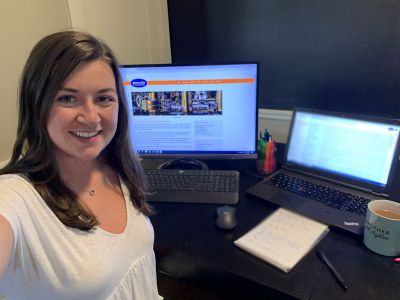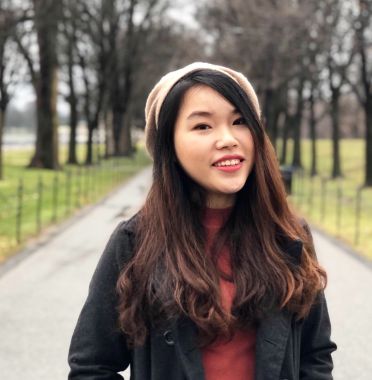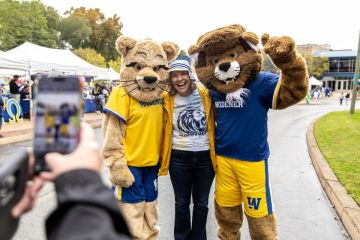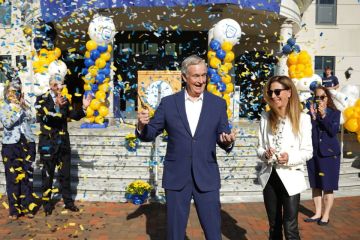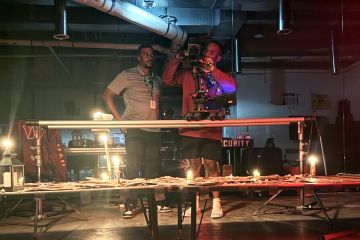Career-Building Experiences Continue in a COVID World

Internships, co-ops, research, and clinical work are just some of the hands-on experiences that help place Widener students on the inside track to career success.
COVID-19 has changed the look and feel of these opportunities. But throughout the spring and summer, many Widener students have continued to take part in these transformational experiences.
Work environments have shifted and uncertainty abounds. But an unintentional benefit of the pandemic is students are honing such essential skills as flexibility, adaptability, and time management.
"It’s great that I get to experience work-from-home. It’s definitely enhanced my communication skills,” said Kelly Dickerson ’21, a chemical engineering major, whose co-op with Precis Engineering shifted from in-person to remote.
Co-Ops Continue
Like Dickerson, many of the students on the 8-month spring/summer co-op, running through August, have moved to working remotely. Others have been able to continue at their onsite placements. Their status has been dependent on their co-op employers’ ability to navigate COVID restrictions.
After a few weeks of disruption, mechanical engineering major Marcus Greene ’21 is back atop a roof between terminals at the Philadelphia International Airport helping to ensure construction follows project schematics. His co-op is the same as it was pre-COVID, but the environment has changed.
“There are masks everywhere. They take your temperature at the door,” said Greene. “You always needed an ID badge, but it’s more stringent now.”
Jonathan Del Duke ’21 never saw a disruption in his co-op. That’s because the computer information systems major is supporting frontline workers at Crozer-Chester Medical Center. Part of the hospital’s desktop IT team, he fixes computers across the facility, from administrative offices to patient rooms.
This experience has taught me a lot about life. It threw me into a very real-world experience. — Jonathan Del Duke '21
Support System
Del Duke initially had concerns about working in a hospital during the pandemic, but he elected to stay with it. He has been bolstered by support from Kelly Tierney, assistant director of experiential learning in the Office of Career Design and Development (CD&D).
“I’m constantly getting emails from her checking in to see how it’s going and showing support,” said Del Duke. “Yes, I’m in an area that’s high risk, but people are thinking about me.”
For students whose placements have been disrupted by COVID, the university has been working to find them other meaningful experiences. One approach has been to engage alumni and connect them with students for mentorships, project-based work, and micro-internships.
Even before COVID, alumnus Mike Coleman ’08 had been considering ways to give back. In April, the Realtor connected with university officials and jumpstarted a remote internship for marketing major Alejandra Borbolla Diaz ’21. Today, Borbolla Diaz is helping the Mike Coleman Team with social media marketing.
“She had the exact experience I needed and the internship aligned with our mission as a team to give back,” said Coleman. “No matter how successful you get, you have to remember where you came from and give a hand up to the people coming behind you.”
Efforts to help students navigate a shifting employment landscape will continue. One change on the horizon is the suspension of the 4-month fall co-op due to pandemic uncertainties. But Widener expects to resume co-op in January with the more popular 8-month cycle.
“The vast majority of students who were expecting to do the fall co-op will have the opportunity to do the 8-month co-op, which is preferred by employers,” said Janet Long, executive director of CD&D. “Students get more experience, they have more major specific credits under their belt, and employers have students for a longer period.”
Internships & Research: Making it Work
By day, finance and accounting major Ryan DiFabrizio ’21 interns remotely with First Financial Group. By night, he participates in an online externship through Financial Planning Association, created in light of COVID. Together these opportunities are preparing him for a career in financial planning.
Taking classes and now interning during the pandemic has taught him the “importance of time management and organization. There are a lot of distractions at home. So being at work remotely you really have to hone in,” he said.
DiFabrizio’s classmate, Thu Le ’21, saw her internship with accounting firm EisnerAmper shortened and converted to an online format. But Le is still networking with people from across the country, hearing from guest speakers, and participating in case study challenges.
“These are still great connections,” she said.
Research has also shifted to accommodate COVID restrictions. Widener’s Summer Undergraduate Research and Creative Activities (SURCA) program is virtual this year, with students and faculty mentors finding new ways to make it an enriching experience.
“The summer research program is a great opportunity, and the fact that Widener gives us the resources we need is incredible,” said Donovan Stuard ’21, a finance, economics, and accounting major, who, along with finance major Noel Franczyk ’21, and Assistant Professor YoungHa Ki, are analyzing how financial markets responded to different stages of the pandemic.
“While we don’t have access to the on-campus Finance Lab right now, Dr. Ki has helped us gain access remotely and brainstorm ways to get the data. We have been able to adapt well,” said Stuard.
Clinical Work Continues through Telemedicine
Shortly after COVID reached the region, Widener’s Child Therapy Clinic and Chester Community Clinic pivoted to telehealth to continue serving clients and to provide graduate students with invaluable experiences. And through telehealth, students are learning to use an increasingly ubiquitous tool for seeing clients.
“With our clinic being such a large part of the curriculum, we are constantly working closely with each other, brainstorming ideas of how to improve clients’ plans of care and treatment sessions,” said physical therapy doctoral student Stephanie Saylor ’21, who works in the Chester Community Clinic, which provides physical and occupational therapy, clinical psychology and social work services to uninsured and underinsured individuals.
“Telehealth has allowed us to re-engage in this task and helps us not only remain close to our classmates, but also keep our clinic skills challenged while we await our opportunity to safely step into our full-time clinic experience,” she said.
